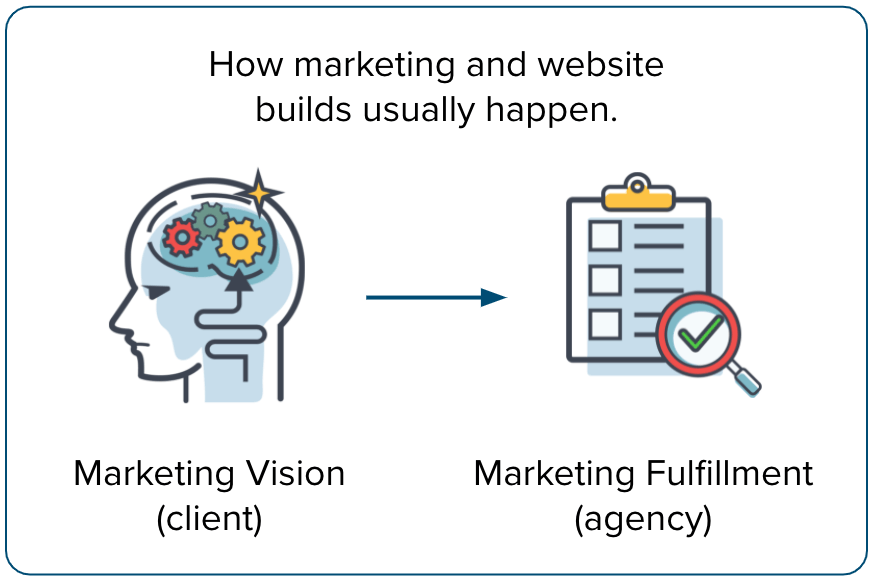When I built my first proper website in 2005, it was okay at best. It was a simple Wordpress website that was mostly a blog. Early 2007, I was working for a technology company and I was able to help our agency create the website for our company. While I didn’t understand at the time, there was no strategic forethought to how that website should have been organized.
In the end, that website I built with our agency wasn’t bad… but it wasn’t amazing. Looking back, I think we got lucky in the execution. It was a bunch of pages that sort of fit together but we were just plugging holes in content and design… and, the majority of that work was after the website was live.

By the end of 2007, I had founded Tribute Media and was delivering websites to companies as an agency. Those websites were definitely not great by my standards today. Technically, I knew what I needed to know in order to create something that looked nice(ish). Strategically, I didn’t have a clue. The first few websites I built weren’t any better than the websites I had built before starting an agency.
I learned over the next couple of years that a pretty website is not necessarily a good website. I’ve seen (and built) so many websites that would fall into the category of “Oooo Ahhhh Huh?”
Fortunately, I have always been one to do things with a long-term focus. I have always looked to the future and wondered “There’s got to be a better way!”
About 10 years ago, I finally understood that there was a distinction between tactical and strategic thinking.
What is Tactical Understanding?
Tactical understanding is understanding the basics of the things that need to be done. It’s a checklist of performances.
While the first websites I built were in Wordpress, my development skills really lie in Drupal and HubSpot. I have partners that help me in Wordpress, Webflow, and Shopify as well. In order to strategically develop those websites, I needed to first understand the tactics of those platforms. I needed to understand how to build views and modules and themes and content types and javascript and servers and DNS and … and … and … you get the idea.
Every CMS (content management systems) is different. Most of my experience has been in HubSpot and Drupal. Even though I’m not as strong in Wordpress, I fortunately cut my teeth on that platform. I have continued to build in a variety of website platforms over the years. In order to be a successful web strategist, I learned that I needed to understand what it took to build those websites.
The reason this tactical understanding is so important is that you have to know what’s possible. In fact, it’s even more important that you know what’s not possible. If you ask your team to do something technical, you need to understand if it can even be done. As an agency strategist, I have to be able to make commitments of what client results will be quickly. If I have to turn to my team on every little question, it hampers my ability to properly develop the trust that is needed to build credibility. If I don’t have the credibility, I can’t build a strategic plan.
What Is Strategic Thinking?
Strategic thinking is the ability to bring all the required tactics together to a solid, executable, results-driven plan. It’s almost never a checklist of things to be done.
No matter what you are trying to accomplish, if it’s worth anything, there are going to be a lot of moving parts. While I speak specifically to web strategy, this can apply to just about anything. You can’t be a good general contractor without having a solid understanding of all the trades that build a house. You can’t lead a team of mechanics without having a solid understanding of how a car works. You can’t be the captain of a battleship without understanding all the roles in a ship.
Strategic thinking does not require you to be a subject matter expert in all the fields. In fact, that would be counterproductive. If you are the best at everything under your stewardship then you likely haven’t done a very good job developing the talent below you.
As a strategist, you need to know enough to call BS if your subject matter experts (SMEs) are trying to sell you a load of… well, you know.
How Does This Really Apply?
 I’ll speak to digital marketing but I’m sure you can figure out how this applies to your world.
I’ll speak to digital marketing but I’m sure you can figure out how this applies to your world.
Early in my digital career, I didn’t understand how much I didn’t understand about so many things. I built websites with limited understanding. I started to help clients with marketing with limited understanding. The results I achieved were limited, at best. (yeah, I said limited a lot in this paragraph)
I learned, over the course of helping 100s of clients (likely well over 1,000) that in order to meet their goals, I had to understand all the pieces of the puzzle and how they fit together. As of the writing of this article, I hold 37 HubSpot certifications in addition to my formal and other informal education. But, holding certifications and degrees isn't enough. It’s about understanding the elements of marketing and website development. It’s about understanding how those elements fit together.
Knowing those tactics allows me to think through my clients’ goals and then help craft a solution that will help them achieve those goals.
You don’t need to be as technical in your skills as I am but if you can’t answer basic questions about what is being done then you can’t be a good strategist. The more breadth you have in your understanding the better you’ll be as a strategist.
If you want to be a good strategist, start by understanding the tactics.
Feb 6, 2025 8:42:00 AM
Ready to simplify and succeed? Let’s make it happen—because your business deserves practical, no-nonsense wins. Find me on LinkedIn.


